Interview 051 • Aug 3rd 2016
- Interview by Lou Noble,
- Portraits of Eliot Lee Hazel by Oriana Koren
About Eliot Lee Hazel
A fearless and truly unique artist, Eliot Lee Hazel's portraiture and stylized conceptual photography has achieved a worldwide cult following. Splitting his time between LA and London, Eliot approaches fashion, music and personal projects with a distinct and singular vision, often exploring themes of isolation and detachment.
He has shot for likeminded brands such as Chapter and Persol, and has collaborated with a range of influential fellow artists including Thom Yorke, Beck, Bat For Lashes, Interpol and Ariel Pink.
Links
Foreword
First as a chef and then as a photographer Eliot Lee Hazel has been able to let his inner voice speak through any medium he applies his time to. In speaking to Eliot we saw a highly creative man that has been able to take a lifetime's learnings and apply them to his current day.
This interview has been edited for clarity and content.
Interview
So let me ask you, because I’ve looked online and the interviews you’ve done are very kind of short, usually the people are doing email.
You should feel very privileged!
I know, I am, thank you very much!
I never really said yes to interviews, also, if you Google my name on the internet, you can’t find one picture of me.
I noticed that, as well. There’s one, I saw one, today! It’s you and Imogen Poots in a road. Because you’re wearing the same beret.
The guy at the magazine took that because I always tell everyone to turn off their phone, because everyone in this generation seems to be more busy with their phone than actually beinng present to what’s going on, to their work, and I’m the one that has to fix the photo, and I can’t stand Photoshop. Well, I can’t say I can’t stand it, I suck at it, so if I see a color that’s crooked, I have to point my finger to a stylist then afterwards and be like “you weren’t paying attention!” But, in the end, I’m responsible because…
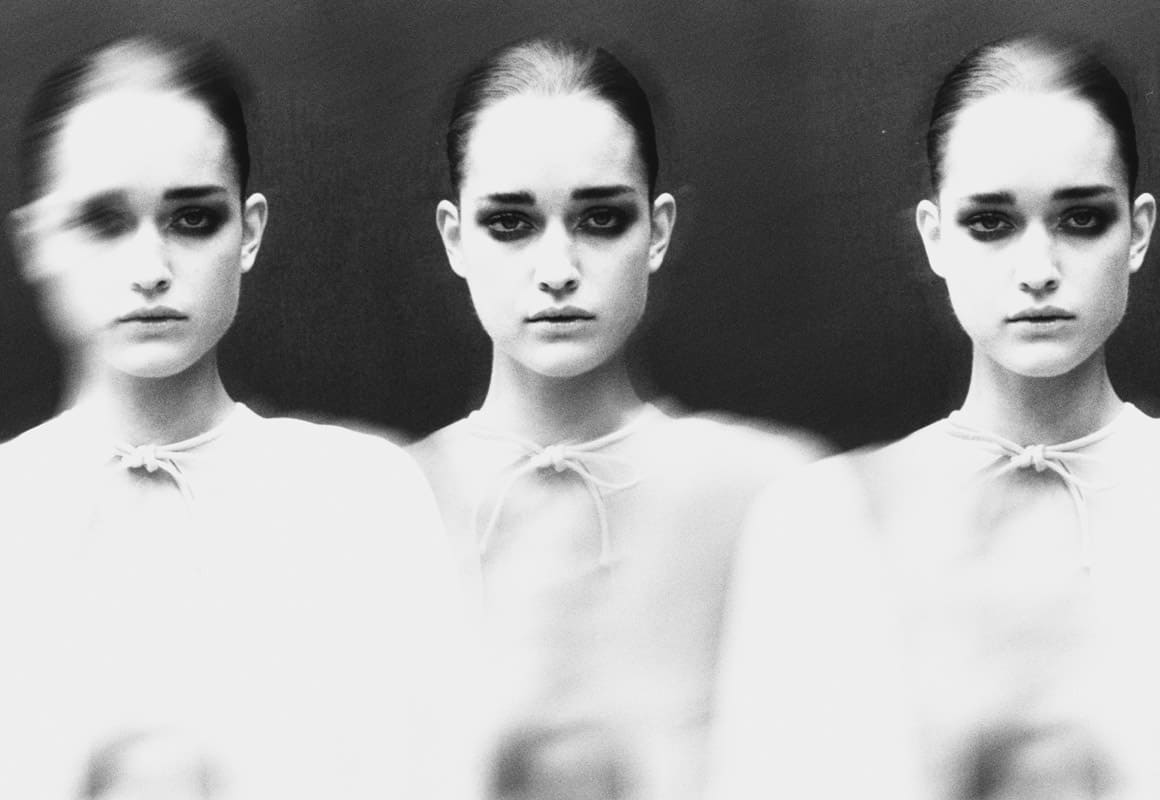
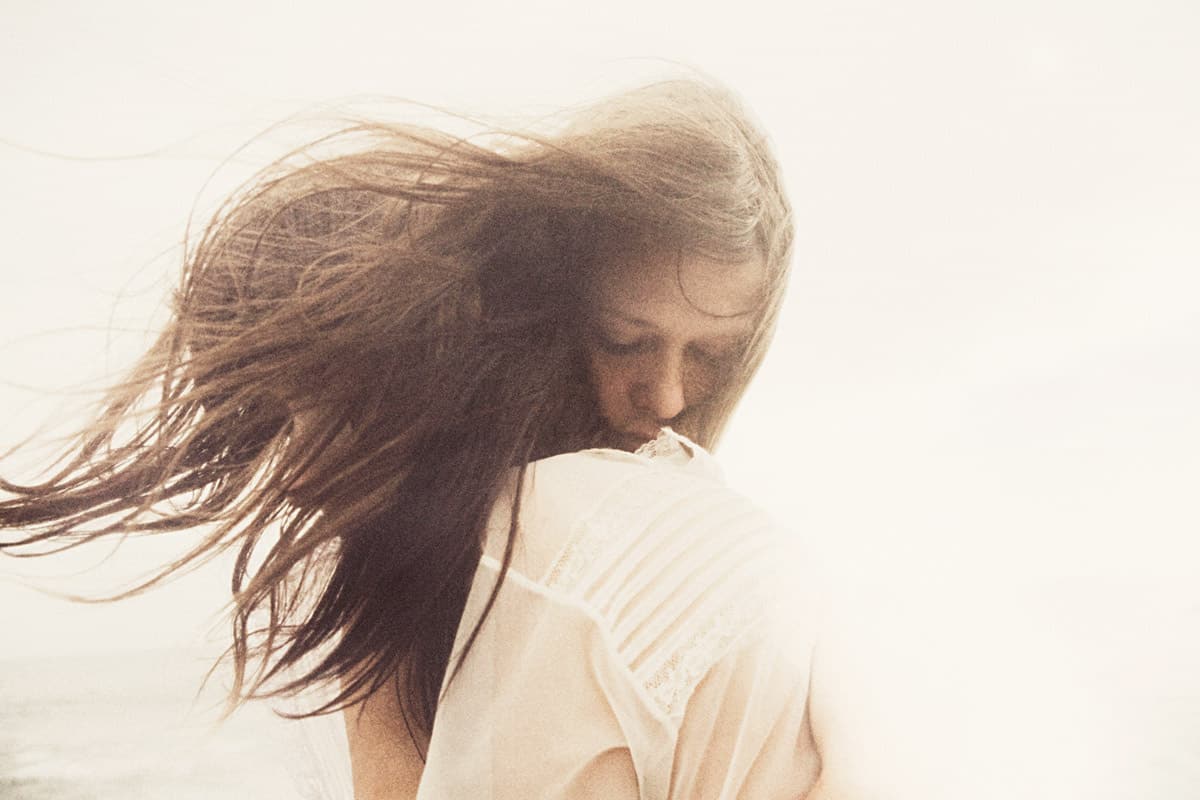
It’s your name on the picture.
What are they doing, they’re like this…or they’re Instagraming the pictures, or taking pictures of me, and for my own reasons, I don’t like to be blathered all over the internet, and I like to stay behind the curtain, so to speak.
You consider yourself a private person, generally?
I guess, yeah. No, not I guess, Yeah.
Haha!
I consider myself a private person, so and interviews…the truth is also, I don’t find myself that interesting to yap an hour about myself, or what it is, so I’ve told interviews, in the past, you can ask me anything, just don’t ask me about my private life, because that’s none of anyone’s business. But with that said, I’m also learning, that’s what people want. They want a kind of…I just started an Instagram account a few months ago.
I saw it, yeah.
I always refuse to do…I’ve never been a part of social media. But these days, it seems like that’s where it all is, is social media, so I had a long conversation with my agent, and my agent’s like “you really should consider doing some Instagraming, or at least some kind of exposure to yourself.”
It’s the devil’s bargain.
But yeah, up until a year ago, because that shoot with Imogen Poots was about a year ago, you couldn’t find one image of me, because I always tell people, “hey I prefer not for you to take a picture of me,” and then people get offended. I already have a hard time, that’s why I’m not a street shooter, I really don’t like putting a camera in people’s faces, unless they are okay with it.
Right, permission.
Yeah. But I’m not the kind of guy like, “hey, do you mind me taking a picture of you?” I just leave people as is, because if I’m having a nice cup of coffee, I don’t want some guy going, “hey man, can I take a picture of you?” Not only that, I look absolutely ridiculous in front of the camera.
Hahahaha!
You have to make that face, and people tend to make you smile, and I tend to not smile, so it’s like okay…not because I don’t want to smile, but I find smiling a very odd thing too, in pictures. Why do people go, put on that pretend face, like, they’re in an argument, then all the sudden, the picture gets taken, and all the sudden, they have this expression on. Just like, a bunch of bollocks…so yeah, I’ve kind of, I got the email two weeks ago from my agent, like, “Hey Eliot, there’s this person that wants to interview you…give it a thought, it’s not so bad, Eliot.” I was like, okay.
It was the timing, I got the timing right!
Yes, you got the timing right! It’s not to be taken personal.
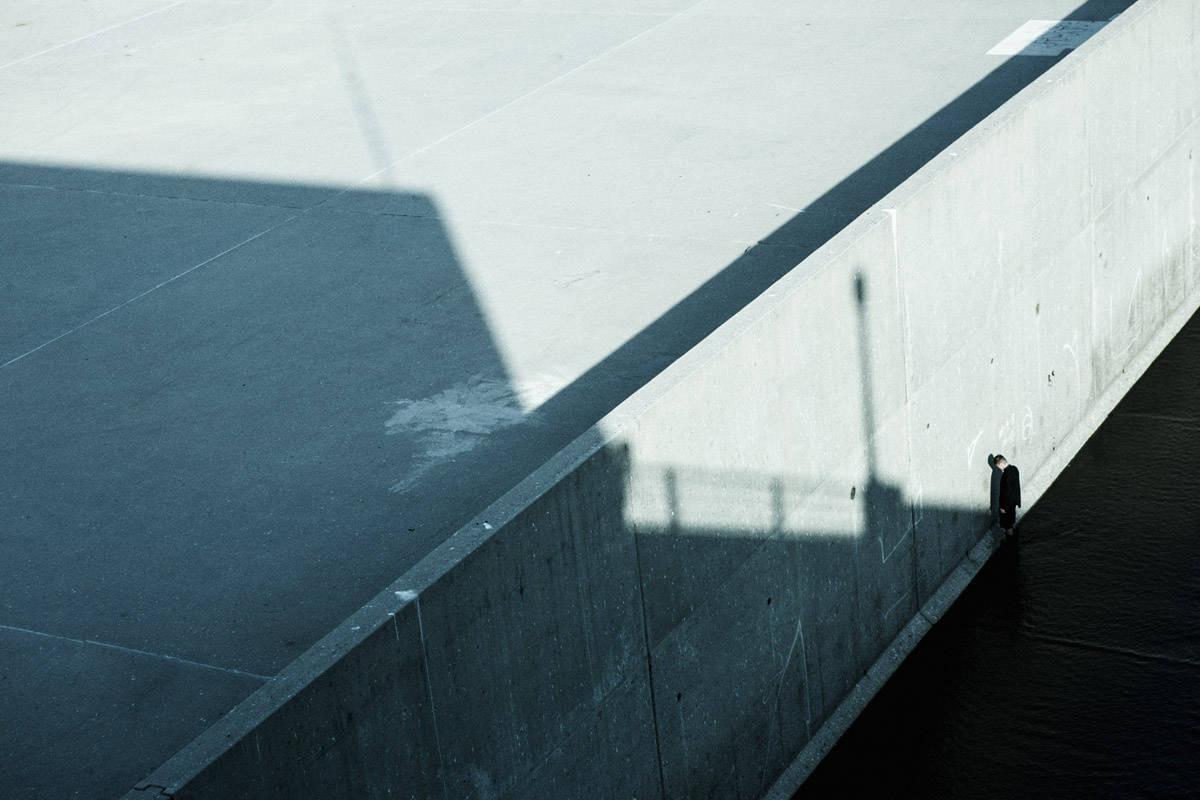

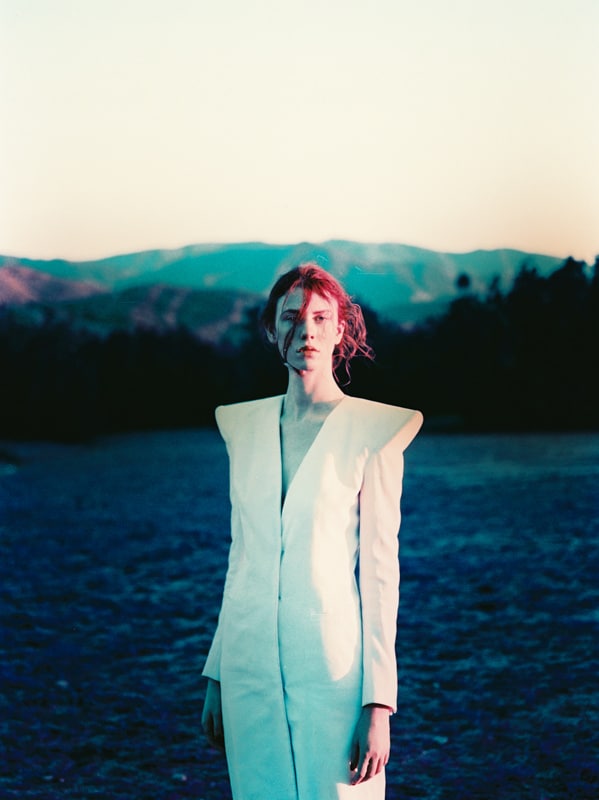
No no, it’s alright!
That’s another thing you know, too, which feels strange, is you know, realizing you have a following. I’m always like, “I’m just this dude who started photography a few years ago.” I was a chef for sixteen years, and photography really fell in my lap; I never wanted to be a photographer, never thought of being a photographer, never thought I would be good at it. I do love beautiful aesthetic things, part of me finds that also very superficial about myself, I love beauty and I love things that are very pleasing to the eyes, but I’m also a Taurus, and that’s a very known thing about Taurus, they like beautiful things. So that goes against me, and it works for me, because in my line of work, which is photography now, is based on aesthetics. It’s based on a certain look. Cooking is the same thing, it’s based on aesthetics, and it’s based on taste. So, do you have a good taste palette, can you present something really nice? So photography just kind of, it was just an extension of that. It went from me dishing up a plate – as you can tell, I still love cooking.
I can see the extensive cooking cook book collection on your shelves.
Yeah, the reason why I read cooking books is because I get lots of pleasure out of it. I don’t ever follow recipes, I just look at something and go “ooh, that looks nice,” and then I create it.
It’s a starting point.
It’s a starting point. But I’m starting to buy photography books, and I used to not look at blogs, I used to not look at other people’s work, and I can’t give you an honest reason why that is because…I was never that much into photography, and now I’m just learning about, wow, that person is a great photographer, or that person has a great aesthetic. Like Jurgen Teller, he blew up, he became the so-called master, or he had a book that he put out calling himself a master or whatever, and me, I was always like “what’s the big deal about this dude, he puts a flash on his camera and there you have it.” But now, I’m looking deeper into it, and now, also styling photography a lot more, he created it. He created a style, he created a uniqueness. You look at a picture and you could tell it’s Jurgen Teller. Now these days, it’s very hard, because everyone started to want to be Jurgen Teller, or started to try to reenact him, so people started buying the same camera, people started doing the same set up, the same flash, the same color tones. And I have people that I’m inspired by. The first photographer that really caught my eye that I was like, “wow, this is really beautiful, I wish I could shoot like that,” was David Hamilton. But you know, a year later, I got bored with that. It’s a lot of nudity, and a lot of young girls, but I don’t look at that. I look at his color palette, and he has such beautiful color palettes…
They’re soft.
It’s very soft, I love soft photography.
Dream-like.
Very very dream-like. This was the first photographer that really I was like, “wow, his pictures look like paintings.” I love the color palette, I love his subjects…
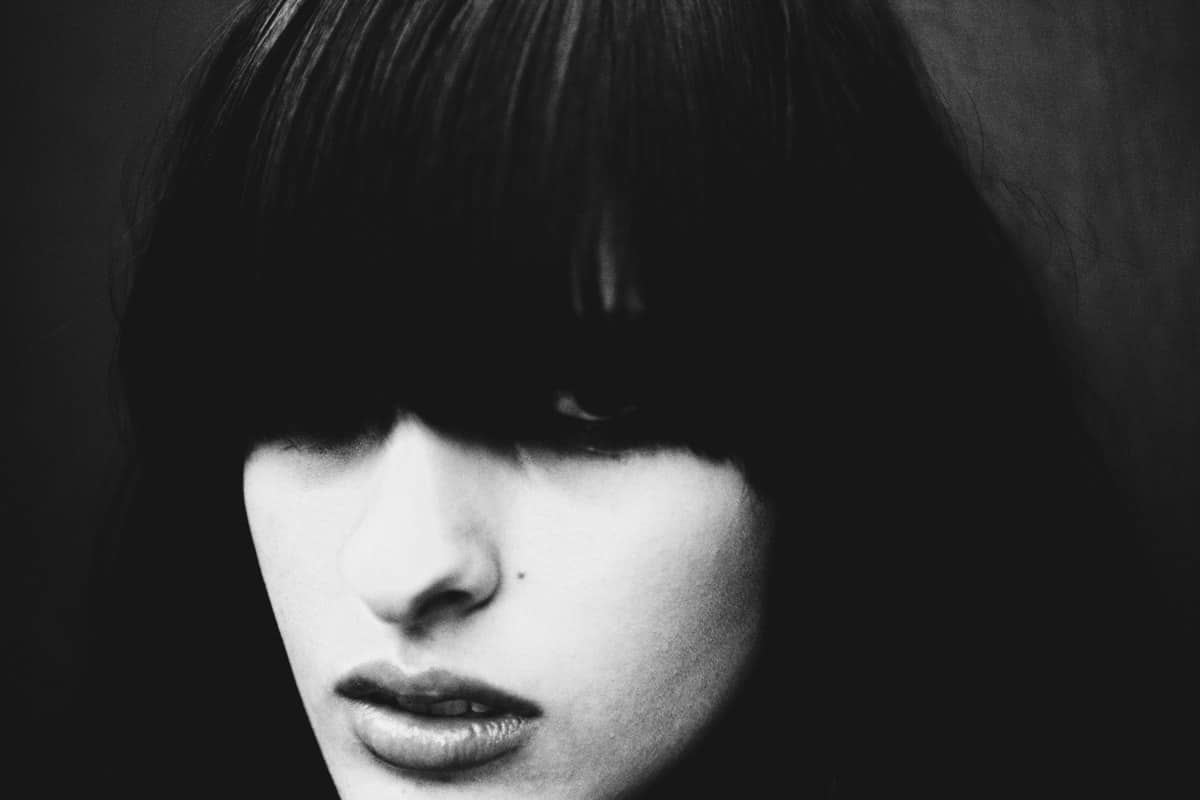
From Shaded for The Work Magazine by Eliot Lee Hazel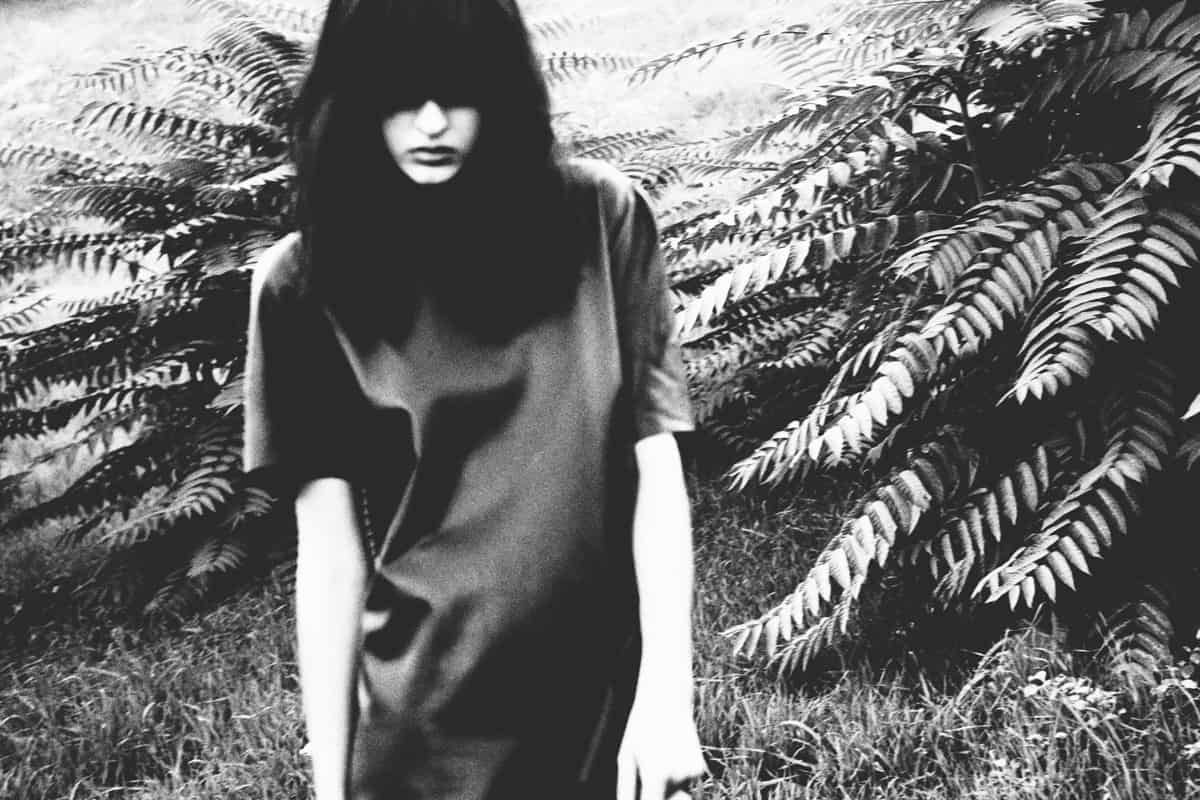
Very painterly.
He always chooses females that have this very innocent look. It’s very, to me, everything is like paintings.
The grain helps to create that feel to it, yeah.
It’s all about innocence, mainly. Yeah, so this was the photographer that, these books got presented to me by a friend, and she says, “Eliot I think you would really like this person’s work, and your work reminds me a little bit of him,” and then when I saw his books, I was like, “woah wait, I really relate to this guy.” But a year later, I got bored with it. And that’s my problem, too, I tend to get quickly bored with things, may that be with myself, my own work. If you ask me, “okay, what is your favorite shoot, Eliot?” It’s very hard for me to answer, to say “I’m really proud of this shoot!” Because I do something, and then I go “ahhh, this is good.” But then I put it aside, and I look at it a month later and go “ahhh, god, what was I thinking?”
So I tend to do that a lot, but I’m also very hard on myself, and now I’m kind of discovering the joy of it all, so it’s like, “oh, it’s just the process.” You get better, or you fall into a place, and you catch yourself a few months later, like, “oh, I’m doing the same shit over and over. Now I’ve got to move away from that.” And where I’m at now in photography, things that I really like are architectural, buildings, and a subject. And what I’ve also always liked is negative space. I like lots of space, but just the subject in the middle…
So how did you get into photography then if you had a career in cooking?
You’re going to hear a funny story now…I never took photography that serious until I realized, “oh wow, people are taking me serious.” So therefore, I started taking it serious. And how I started photography is this: I was a chef, I went to culinary cooking school, I was cooking at a 3-star Michelin restaurant…
Still in Holland?
Yes, still in Holland. I was born in England, and when I was 4 years old, my parents moved to Holland. So I lived in Holland for 25 years.
Oh wow.
And I’ve been living in LA for eighteen years now. In Holland, I met this lady, who ended up being my wife, she was living in America, she had opened a hair salon store here in America, I came to America, and I wasn’t over cooking, but I knew that I was getting burnt out. I had done it for a long long time. I don’t know if you know anything about the restaurant business, and especially Michelin star cooking…Michelin star cooking is kind of like the highest level, if you fuck up, you’re pretty much out of the door. So there’s a lot of stress, there’s a lot of yelling, and there’s a lot of responsibility. And I looked at the chefs that I really looked up to, and I was like, “man, none of them seem really happy. They’re all kind of angry and bitter, they yell a lot, and they work twelve hours a day!” And there’s two options you can go: you can either be a chef at a restaurant and have a salary, and have the responsibility of being the head chef, or open your own restaurant. Now, I can’t say that I never wanted to open up me own restaurant, in the beginning, that was kind of my initial idea. But I was working for these chefs and then became a chef, and then I started to realize, “I don’t know if this is the life I want anymore.” Because it’s like being in an office from 9 to 5; everything becomes the same.
You see the same faces, the same stories, but in the kitchen, it’s almost amplified, because the kitchen is blazing hot, there’s a lot of stress because “Table 3, they wanted without sauce, we need a new plate!” And there’s often no windows in a kitchen, you either under a restaurant, you know, where the kitchen is, the restaurants where I worked, the kitchen was under the restaurant, so there’s no windows, and you see the same people, the same crew, every day. And the last restaurant where I worked was called The Swan, it was a three star Michelin restaurant, and I was working there for three years, and for three years, I saw the same faces. “What did you do last night?”
“Oh, after work I watched a movie and fell asleep. Oh what did you do Thomas?”
“Oh, I came home, my girlfriend had crashed, so I went out with the boys, drinking.” And every day would become that story. And when I looked at the chefs that I really looked up to…well, fifty year-old guys look seventy, you know, and they all drink heavily, it’s a rough life. Being a chef is a really rough life. But you also have to keep in mind, that ten years ago, chefs weren’t what they are now. Now, chefs are considered almost like rock stars or celebrities. So if I was where I was then, now?
It may be different.
It might be completely different because I also wasn’t making the money that they’re making now. It was a really hard job, really hard job, it was twelve hours a day, full on responsibility, cooking cooking cooking, and coming home just being exhausted, and you’re practically –
It’s your life.
You didn’t have a life. You had to love what you did, and I loved what I did, but I was also a bit of a workaholic by working twelve to thirteen hours a day, I was in the kitchen from 9am to 1am, and my girlfriend says, “Eliot, I could have married a pan instead because you smell like food, you talk about food, and when you come home, you’re cooking for me!” And I worked five days a week, and those other two days I would either be practicing dishes or whatever, and as I said, it wasn’t what it was now. If I would become a chef now, yeah, it’s easier to find investors to open a restaurant, back then it wasn’t so easy. Not only that, chefs were just chefs. And not that you have to be bowed at or whatever…
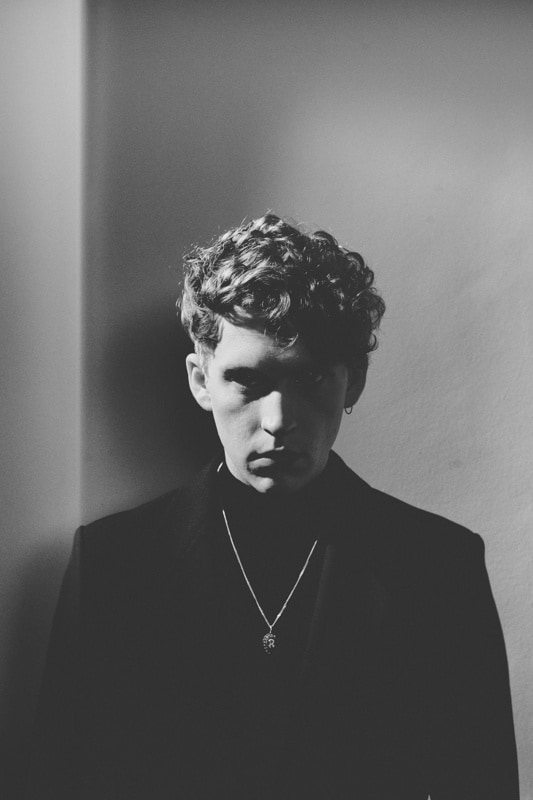

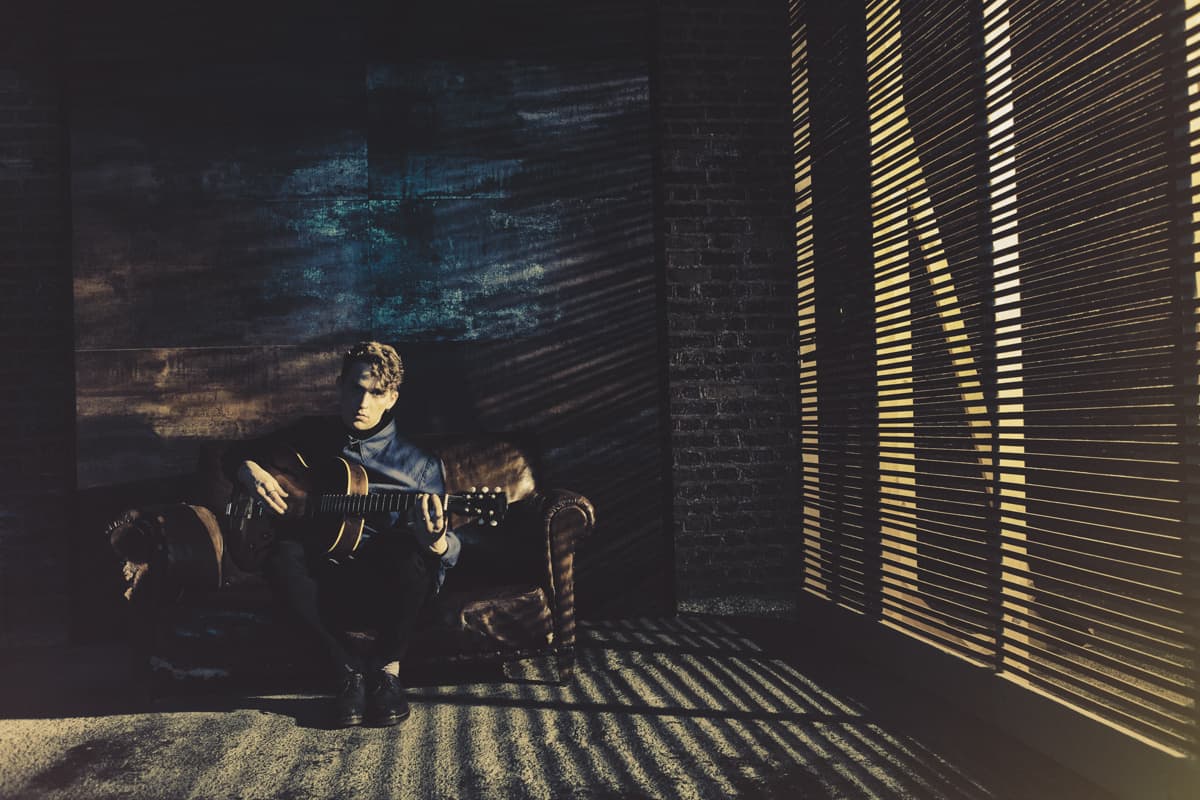
Rhodes by Eliot Lee Hazel
More respect.
Yeah, there’s so much more respect given, and which also leads to more doorways as a chef. So I came to America, I became a private chef, and I cooked for this gentleman for several years, then he ended up dying from age, not from food poisoning!
Hahahaha!
And then I realized then, “shit, is this really what I want to do?” Because when you’re a private chef, you’re kind of a slave to that person, you’re still working for a boss, that person is still telling you what to do, and you still, in a way, have a 9 to 5 job. Because you have to show up, cook them lunch, cook them dinner, and then you leave. And at the end of the week, you’ve got a paycheck. But if you don’t show up, there’s a lot of “why weren’t you blah blah blah?” Or if you don’t cook the dish he wants, I was just like, “You know what? I don’t want this anymore.” And then I realized, I’ve been doing this for 16 years, I cooked for 16 years and I was like, nah, I don’t want to do this anymore. And I had no idea what I wanted to do. So my girlfriend at the time was a stylist/costume designer, she did a lot of video, music videos. Back then, there were still a lot of music videos, and a lot of creativity, and a lot of money for music videos. She had this little shitty camera, this little shitty digital camera she would always take pictures with, and on set she was always taking pictures to remember the clothing.
Continuity and all that.
Yeah, and also, to give the magazine credit when they needed credits, “what was such and such wearing?” She would have a picture. And I would sometimes take her camera and just take pictures with it, and I really enjoyed it, and I think I bought myself a little shitty digital camera, a $60 dollar Sony camera, 3 megapixel camera, and I started to realize, I really like taking pictures, I really enjoy it. And then one day I was on set, and my girlfriend says, “hey Eliot, do you want to assist me on this job, because there’s a lot of costumes, and this photographer really likes your aesthetic Eliot, so I kind of have to dress them the way you dress.” I dressed a lot different, I liked really tailored suits, like Jack the Ripper kind of stuff. Long story short, I start taking pictures on set for her, but at the same time…
For yourself, too.
I was taking pictures of the models, but the photographer had said, “hey, no pictures on set, please turn off your phones…”
Or whatever you had back then.
“…please don’t take pictures!” I was still taking pictures, and it would interfere with the strobe, with the flash, and he would turn around and be like, “what’s going on?” He was yelling at his assistants, “what’s going on with the strobes? Why are they going off?” And then my girlfriend said, “Eliot! Turn off your flash! It’s interfering with the strobe!” I was like, “oh shit,” so I turned it off. So here I was thinking I outsmarted the photographer by turning off the flash and taking pictures, and going, “oh, I got some cool pictures of these cool looking models,” and I went outside to smoke a cigarette, and I put my camera on the table, went to grab something out of the car, and it was lunchtime, and the photographer sits down, and my girlfriend was sitting next to him, and he grabs the camera, and he starts looking through the camera. And he goes, “what the fuck is this? These pictures are amazing!” And I come walking in, he’s with the camera, and he sees me, and imagine this, there’s a table with a handful of beautiful girls, models, my girlfriend is sitting next to him, his assistants, and I come walking in, and points to the camera, “what the fuck is this?” And I turn bright red, I go, “uhhh, I’m just taking pictures for the stylist, for credit!” He goes, “these pictures are amazing” And I thought he was being sarcastic, that he was making fun of me, and he said, “If I sent these pictures to the magazines, or if I send mine, they’ll take yours!” And again, I thought he was being sarcastic, and I thought he was making fun of me, so I kind of just, I turned around and said, “you know what, you’re kind of an asshole.” And I walked back out, and then my girlfriend came and was like, “he’s really serious, he told me that he really loves your pictures.” So I was like, “well, he’s got a funny way of saying it.”
So I came back in again, when I was kind of ignoring him, thinking “fuck him,” and you know, at night, we come home, and my girlfriend as we’re driving home, she says, “he really likes your pictures, Eliot.” And I’m like “yeah, whatever, I don’t think, I think he was just being sarcastic and trying to make fun of me.” And at night, the phone rings, and I’m cooking, and she picks up the phone, she goes, “hey yeah, he’s standing in the kitchen.” And he goes, “can you pass him the phone?” I get the phone, I’m like, “hey fella,”
“you’re upset with me, eh?”
“yeah, I thought it was kind of childish what you said, and you kind of embarrassed me in front of all these pretty girls, why did you have to embarrass me like that?”
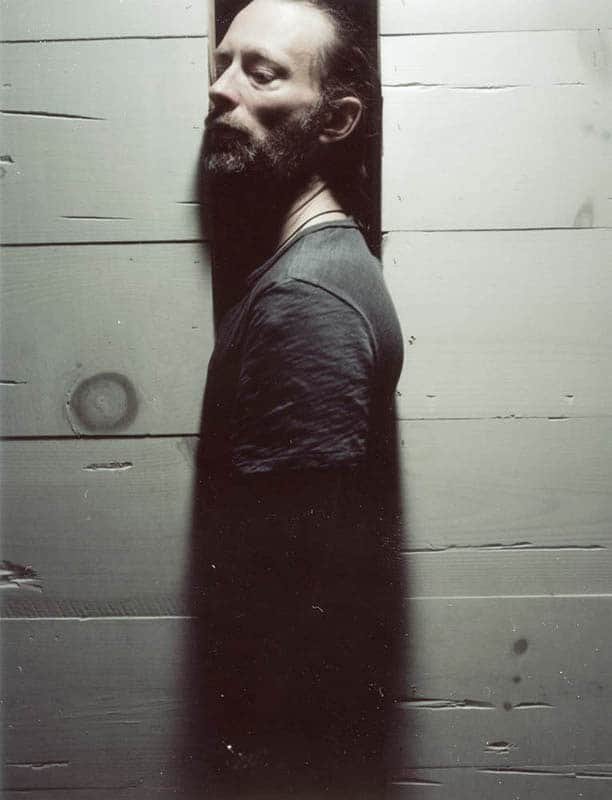
Thom Yorke by Eliot Lee Hazel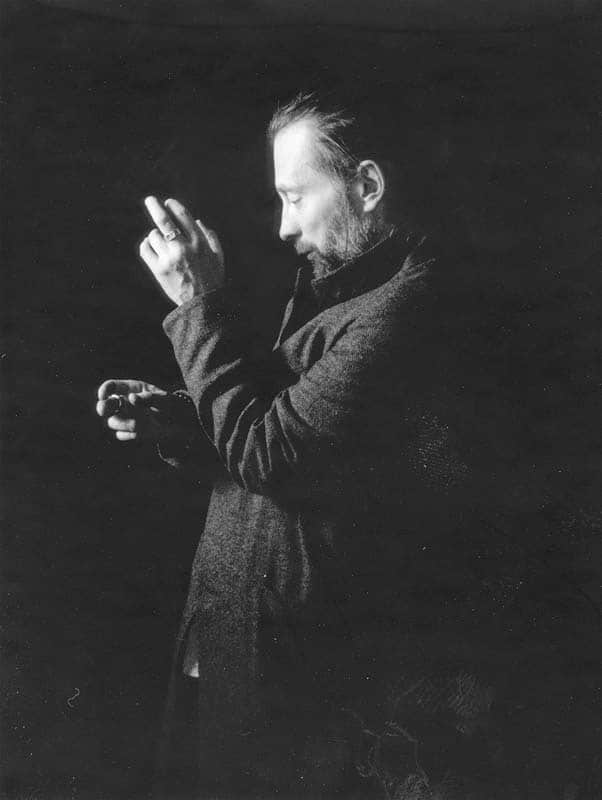
“I was being real serious.”
“Yeah, right. Listen, I have no problem with you, I think you’re actually a really nice guy, and you’re funny too, but I didn’t appreciate it.”
“What are you doing tomorrow?”
“Uhh, not much.”
“Why don’t you come to my studio?”
“For what?”
“Just come to my studio.” So the next day, I drive over to his studio, and he had this studio in Venice, and he’s sitting, and he says, “Sit down, Eliot. You still mad with me?” And I’m like, “no, I’m not mad with you, I just thought it was childish.” He goes “well listen, I know you’re an amazing chef, and your girlfriend raves about you and how good your cooking is,” and he says “But, I want to tell you something, and I want you to listen to me closely.” He says “I’ve had many assistants, and I’ve been shooting for thirty years, but you have an eye. A very unique eye. I’ve never given anyone a camera or bought anyone a camera.” And he goes, “here’s a camera for you, that’s how serious I am.” And I’m like “uhhh really?” He said “now, start shooting. Quit what you’re doing. Quit what you’re doing and be a photographer.” So I was like, “really? How does this thing work?” He goes “go online, and look at some tutorials, or play around, just play around with it and you’ll figure it out.”
So I started shooting, and I did have fun with it because I liked it, and then my friend, friends of friends, asked me if I could shoot their album cover, but I really didn’t know what I was doing, and she was doing the video for this band, this band was called We Are The World at the time, and I went with this person that was making this video, and I started kind of taking behind-the-scenes pictures, and one of those pictures turned out to be their album cover, they liked that picture so much. And then that picture got put on the internet, and there was a lot of talk about it, and people loved that picture, and then about two months later, I get a call from a guy in England, and he goes “hey Eliot, you don’t know me, but my name is Otis, I represent this agency of creative directors for music videos, but I’m starting a photography agency, and I really like your work, you don’t have much work, but I really like what I’ve seen online. Would it be possible for you and I to have a meeting?” But I really really wasn’t taking photography serious, nor did I think that I was going to do this. But I go, “yeah man, sure!” He goes, “well, I’m in England, and I’m going to be in LA in two weeks, and I would like to meet you.”
So he walks in, two weeks later or whatever he’s here, and he sits down, and he goes, “listen, so I’m starting this agency, we’ve got a few selected photographers that we have in mind, this person, that person…” I’m like, “I don’t know any of those people.” And he goes, “…and we would really like to represent you, how do you feel about that?” And that’s how it kind of started. And then, yeah, before I knew it, I was booking jobs and whatnot.
That’s crazy.
And now I’m a so-called photographer, unknown professional photographer. But I love it, I really do love what I do, because I have to have an outlet somehow to let things out, and I suck at sketching, so that doesn’t work. I tried sculpting for a bit, got very quickly bored with that, and photography is a way for me to express myself, it’s a way to make a living, so to speak, and it’s a way to keep my mind occupied, because I tend to have a lot going on in my mind, it never sits still.
Do you find yourself thinking about shoots ahead of time, and stuff you want to come up with, or would you consider yourself conceptual in that way?
I used to never make mood boards, I used to never have a single clue what I was going to do. I would get booked for a job, I would fly to New York, or do a job in LA, and say if you’re the subject, I would be like, “hey man, nice to meet you, Lou. So umm, start over there.” That’s really always been my tactic, I would just look at the scenery and see where I could place you, and I jump around a lot, I jump on tables, I tend to move a lot, and then I try to find that angle and look for something interesting. But then when work started getting more serious, or it started becoming more busy, clients also were like “can you send us a mood board?” but I sucked at Photoshop, sucked at, what is it called, Bridge, and I didn’t even know how to make a mood board. So I would take pictures from the internet and send them through an email, and they would have twenty pictures in a random email like, “I kind of like this, I kind of like that.” And to this day, I still don’t make solid mood boards because I’ve also learned, as I just expressed to you, I cannot always do the same, but I change it every time a little bit. Maybe with the kind of film I shoot, or the color tones that I add to it in Photoshop, or the location; location is always really important to me, because I think location is 80% of the image. I would say, 50% location, 40% subject, 10% is the photographer.
Right.
You just press a button, really. But without a location, that makes the image already less interesting, but if you have a really amazing location, that’s already half the picture. And then if you have an amazing subject, then you’re almost all the way there, then you just need to make sure that you press the right button. So as long as I manage to press the right button then, you know, ahhh, I do okay. And then there’s a few things that I’ve been commissioned for, and I have given it some thought of what I want to do. But, again, it tends to always be the same. The last two things that I got commissioned for , I just wanted to create a form of isolation.
So that was just an idea, a vague idea in your head of that one thought.
And may lightning strike me down, or you might run into this person, you can ask them, we shot this in half an hour, and we shot a whole series.
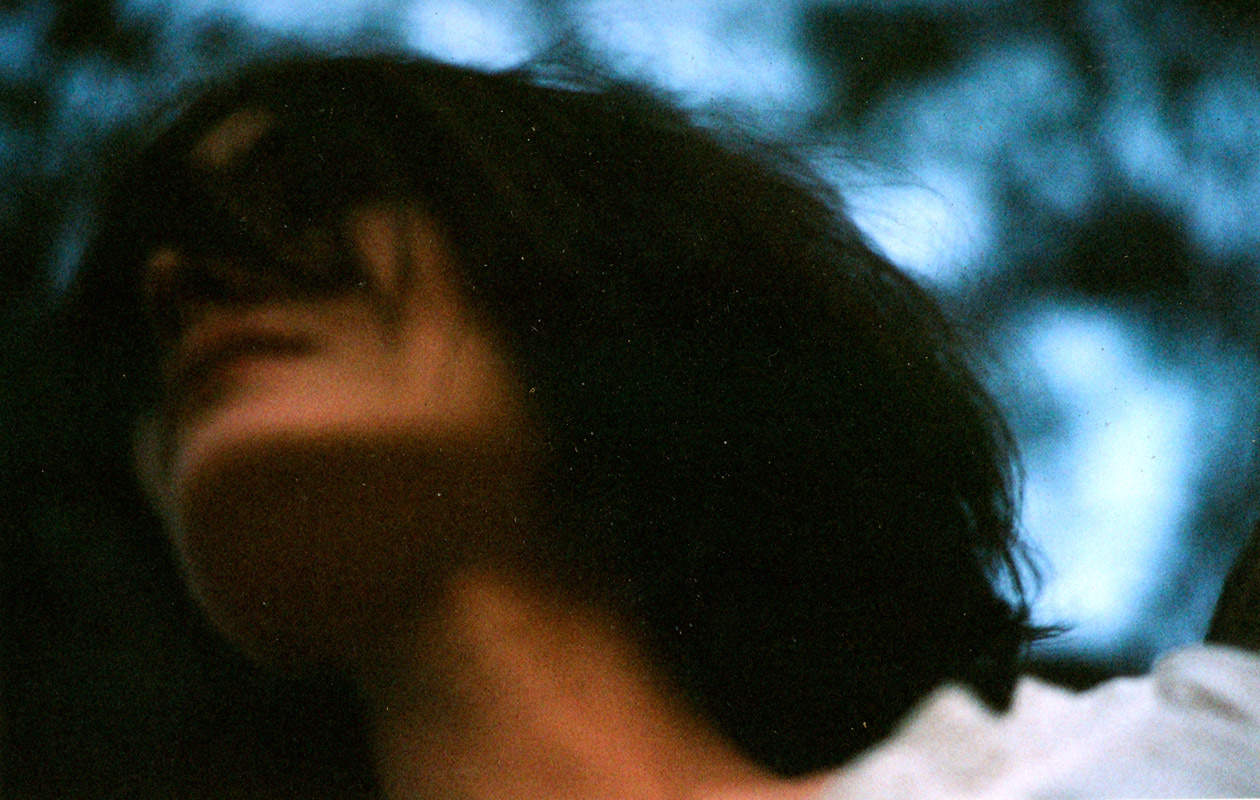
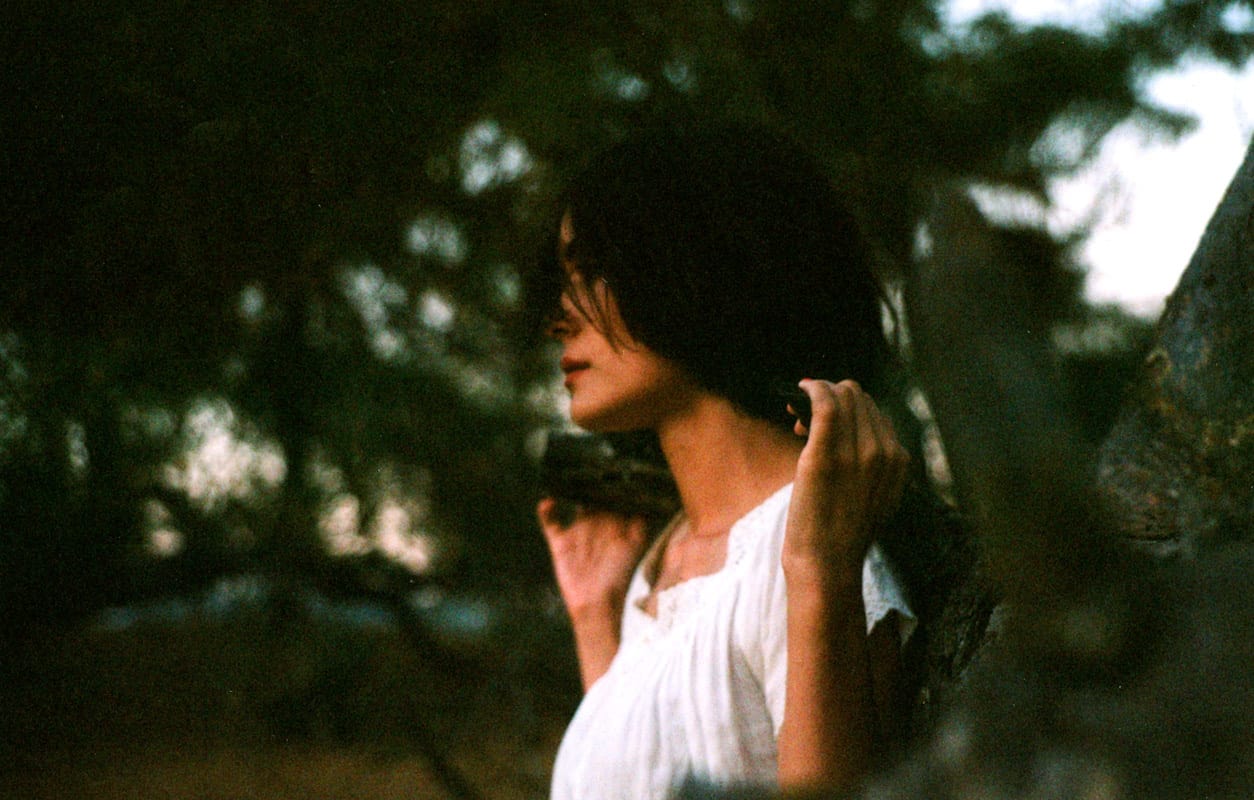
Shannyn Sossamon for The Wild magazine by Eliot Lee Hazel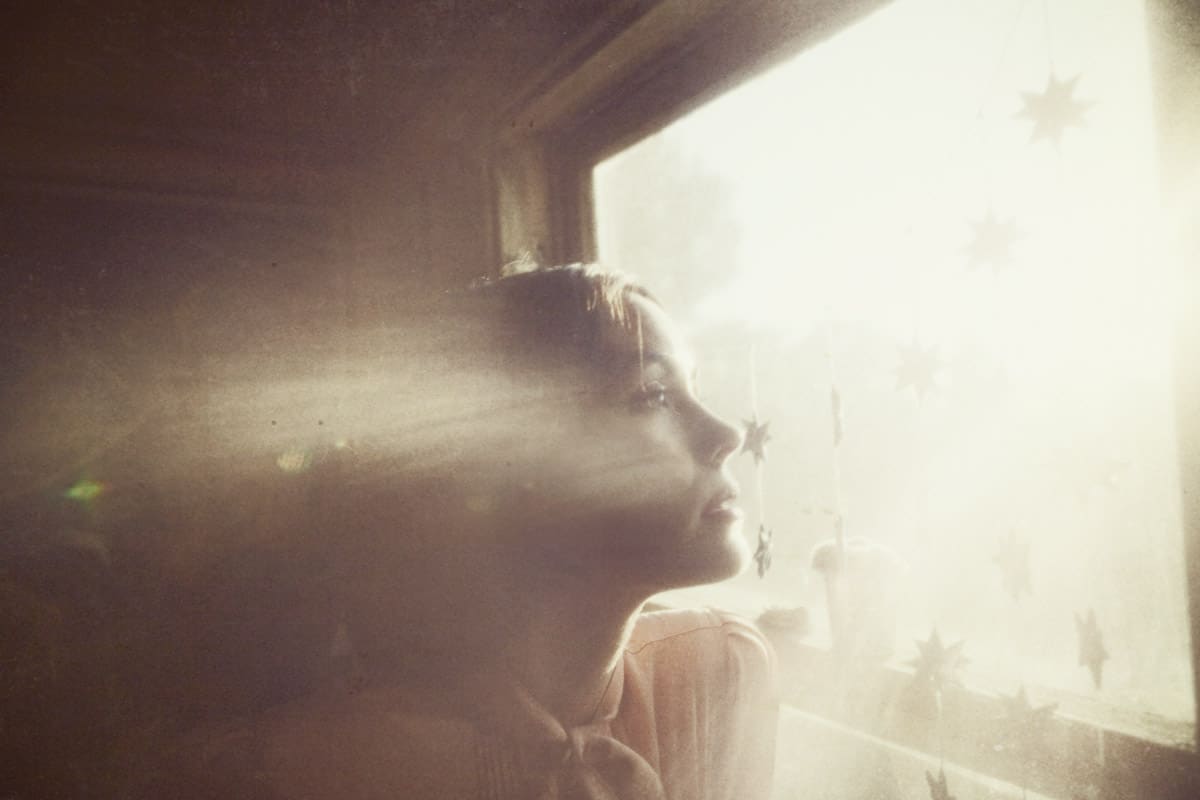
Oh wow. So, do you have a preference between digital and film? Are they just tools for you, or do you have a special relationship to one over the other?
Digital is not a preference, but it’s a huge ease, especially now, because clients don’t really have the patient anymore. They want to see the images within four days or three days, if I shoot an album cover or if I get assigned, then my agency makes big points, like, “okay, Eliot is going to shoot all film, it’s going to take you a minimum of a week before you see anything, and you won’t see a hundred images, you will see fifty, and from those fifty, Eliot will make an edit.” So they either have to agree to that, or not. Some clients don’t agree to that, some clients understand my process. Now, with digital, an advantage is that you can turn it around really quickly, there’s not much risk besides if the camera breaks, but you can kind of see what you’ve got. With film, you often don’t know what you get, and I have a tendency to use really fucked up film. I use very cheap film, I buy it at CVS, I buy it at Walgreens, I buy it on eBay. Old old film, the cheaper the better. I don’t keep my film in the fridge, I keep it at random places.
So half of it doesn’t work, but I still shoot with it, and why, because it has color shifts, and that’s the reason why I love film, and I’ve never been a fan of sharp images, I’ve never been a fan of natural colors, unless it was film from the 70’s or 80’s, that ektochrome had really good colors, deep reds and beautiful skin tones. But now, film is made to be really crisp.
It feels flat.
It feels flat, less grain, and it almost looks like digital. If you use…I use a Mamiya camera.
I have a C330.
Ahh, okay! And if you get it sharp, it almost looks like digital, it almost looks like digital. But what I love about film, you never really have to fuck with it. Digital, you always end up fucking with it. You go, “oh man, the highlights are blown out,” or “man, those blacks don’t look good…”
Not rich enough.
Yeah, not rich enough. Or the skin tone looks off. So yes, I use 50% digital now, 50% film. If I had it my way, I would shoot only film, but it’s becoming a headache. It’s becoming really expensive. Labs are closing left and right. To get a hi-res scan is $30-40, and it’s a pain in the ass. You have to buy film, you have to get the film developed, then you have to send it to the client as small scans, then the client sends you back-
Their selects.
Then you have to go and get those scanned again. I used to scan everything on a flatbed, until I learned and saw the difference between a hi-res scan or a regular scan and I was like, “oh shit, this is an amazing difference.” But I would say 70% of my work has all been done on a flatbed. But the downfall of that is, if I want to blow it up now, I can tell the difference, and back then, I couldn’t, because I would only look at it this big.
Now that you’ve seen your stuff up in a gallery, yeah.
And then you can really tell the difference. So do I have a preference for film or digital? Yeah, I surely do. I think film blows digital away, and I actually think that shooting film is easier than digital, because, not that it’s easier, there are risks involved because if your shutter doesn’t work, or if you have the shutter at the wrong setting…
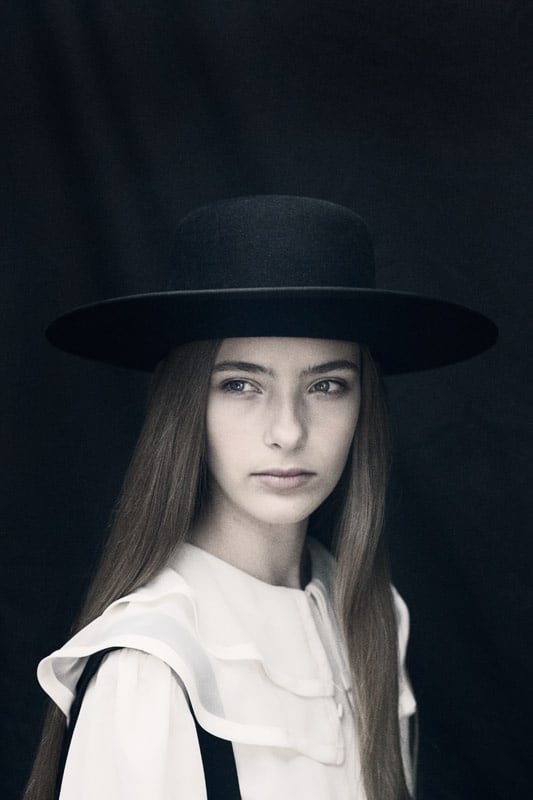

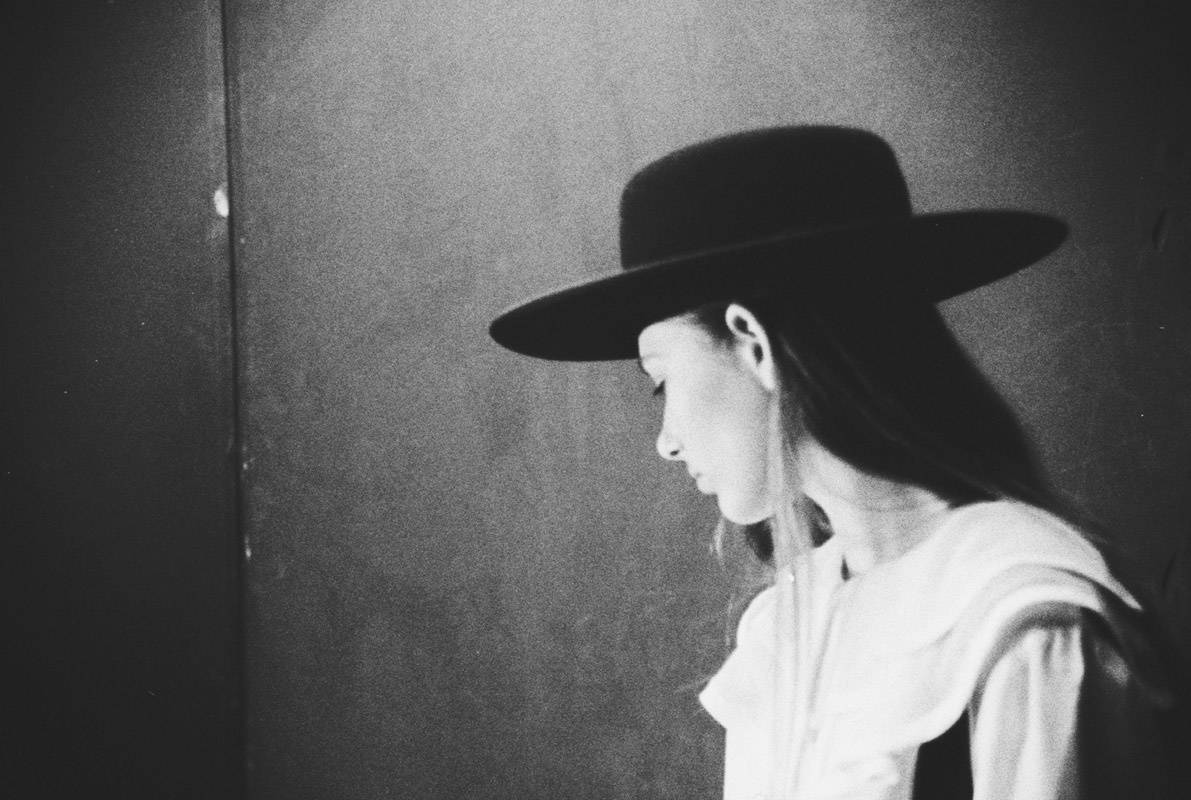
Calandra Stavroudis for Thvm by Eliot Lee Hazel
And then you don’t know until you get it home.
You don’t know. But if you have everything right, there’s so much latitude, and you can push it, but with digital, now, these cameras are getting really good, but it just looks, there’s something off. There’s something…when I load a digital image in, I go, “ehh”, when I load film in, I go, “oh, this is exciting.”
It seems like you’re not drawn to reality in that way. Digital is getting better and better at capturing reality, but many of your photos, especially in the tones, you go for something not true to what you’re seeing, in terms of color. You have a color in mind, but that’s not necessarily what’s there. So digital can’t automatically do that for you, it can only record. You’re trying to interpret.
Yeah. But digital is, it’s so much easier, and especially with clients now. The turnaround time, you have so little time, and if you have two or three jobs a week, try to shoot film and try to get the jobs done on time.
Right.
You should practically have about seven days to get a job done, the deadline is seven days, the client wants, they want the folder with all the images ready, done, retouched. And I can’t keep up with it anymore.
Do you feel a difference when you shoot celebrities versus other subjects?
Yeah. I don’t shoot a lot of celebrities because they bring a whole entourage; it’s the publisher, the agent, the editor of the magazine, and the stylist, the groomer, the makeup person. I like to just bring the subject, go, “let’s jump in the car, let’s go somewhere,” and if they insist on having a groomer or a makeup person, then I bring them with, but for like, let’s use Thom Yorke, as an example. He’s a big, known person. I said, “hey Thom, how would you feel about it if we don’t have a groomer?” He goes, “that’s fine by me, Eliot.”
“How do you feel about if we don’t have a makeup artist?”
“Why?”
“Because the less people, the better I’m focused.”
“Yeah, as long as you think you’re good with that, Eliot.”
“Perfect, I’ll see you at my place at one o’clock, there will be no one there, it will be just you and me.” And I said, “and maybe an assistant.” And that’s how we did it. Celebs, you know, come with a lot of baggage. And then, the dealing with, “oh we don’t like that image, or the person doesn’t look good.” I have a tendency to either make people look really dramatic or, I like drama, I like capturing something that is not necessarily seen. And celebs, you always have to kind of make them look good, and I necessarily don’t want to make a person look good.
Right.
I like to capture them in a moment where you go, “oh man, that looks good.” Does that make any sense?
Is it…you said earlier that you are drawn to beauty, but you also kind of rebel against that.
Yeah.
It seems like a lot of the work you do, yes, it’s pretty, but you want to kind of add an element that adds more too it than just that.
Because what is beauty, really? Beauty becomes boring very quickly, but if you add an element that’s a little bit off…you can have the perfect face with the perfect nose, the perfect eyes, the perfect ears, blady blady blah, the perfect face; but how much more interesting is it when it’s not perfect? When you just see something and go ahh, I like that!
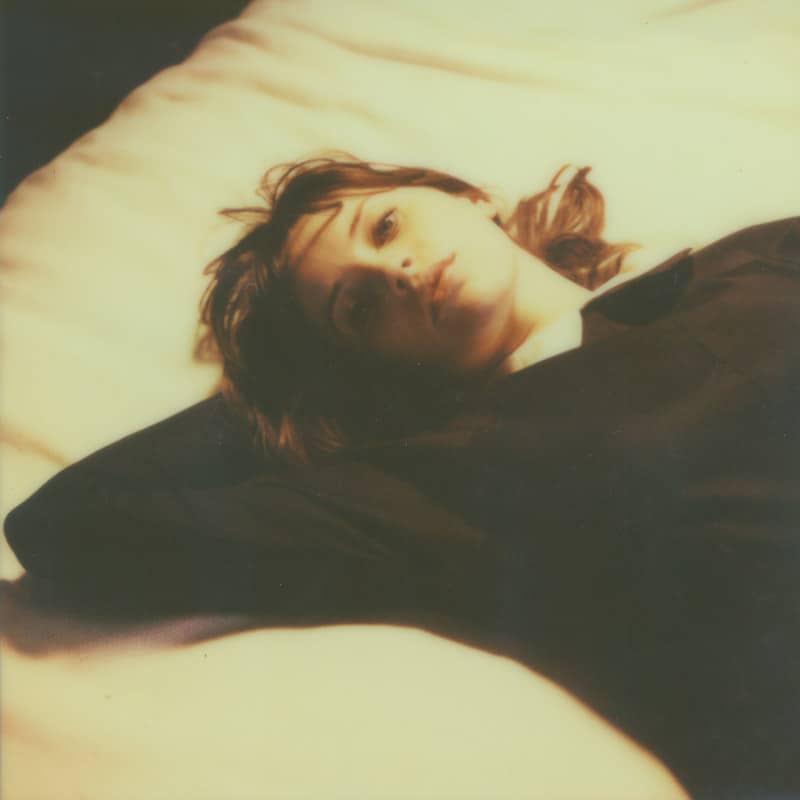

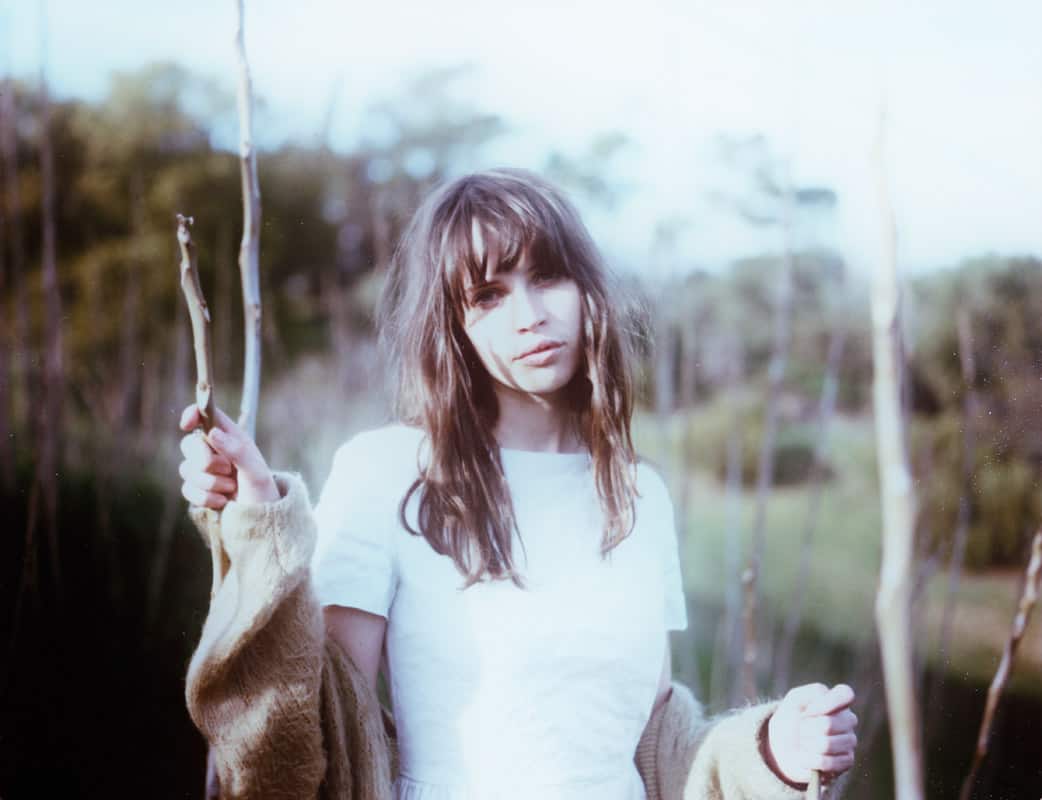
Felicity Jones for Fourth and Main magazine by Eliot Lee Hazel
Yeah.
Not that I don’t like the perfect face, you know, and we all, me especially, I tend to be a perfectionist, which goes against my own grain, which I wish I wasn’t because I’m never really happy. I’m always going, “aw man, I wish it was placed a little bit to the left, or oh, the chin is too much up.”
Mm hm.
“SHIT, I should have paid more attention!” Or, I’ll ask my agent, and my agent say, “oh Eliot, that’s a great shoot!” And I’ll be like, “nahhh.”
Hahahaha!
It’s not so good, I could do way better. “Stop being so hard on yourself, Eliot!” So I’ve come to also be a little bit easier on myself, because I tend to, you know, and that’s from cooking. With cooking, everything has to be perfect.
Just right.
There is no time for error, there are no mistakes. And if there are mistakes, the plate gets sent back, because if you want a steak, and you want it medium rare, if it’s slightly overcooked, what are you going to do?
If you’re at a three star Michelin restaurant, yeah.
You’re going to send it back. You’re not going to be spending $100 on a steak that’s not perfect.
Right.
So it’s kind of ingrained in me. And then, because I’m a Taurus, Taurus’ tend to have that tendency to be perfectionists, and it’s a lot of things about Taurus’, I’m not that great, I really work against it, but that can also work for it, because being a perfectionist can also be really good, because you’re never really happy, so you’re always striving to do something better.
Creatively, that’s great, because you’re always growing. What’s your process for learning and improving?
Trial and error. If you ask me to set up lights, I have no idea, if you see how I light people, I use Home Depot lights, because that’s how I taught myself.
Right.
So yeah, there’s a lot of trial and error. Now, if I have a big shoot or an important shoot, or there’s a lot of pressure, and certain things really need to be done, like a campaign, then I hire my lighting guy, and I have an assistant, but in general, I’m self taught. I just kind of was like, “how does this work?” And I learned; I would get the pictures back, and think, “what did I do wrong?” And when it comes to lighting, I’m a big fan of natural lighting, because you can kind of see what you have. With strobes, I’m always like, “huh, I don’t get this strobe stuff. “Or I like, I think it’s called constant lighting?
Like studio lights.
Yeah, studio lights, that are constantly on, I love those.
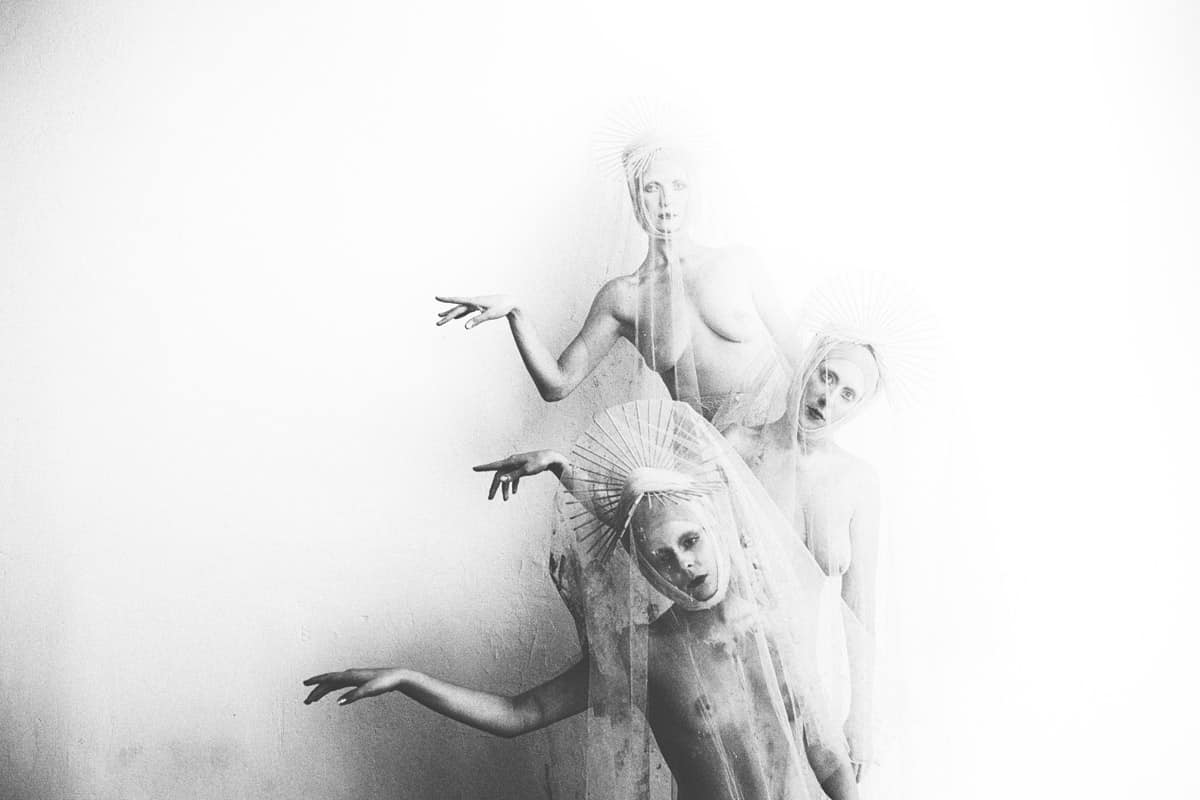
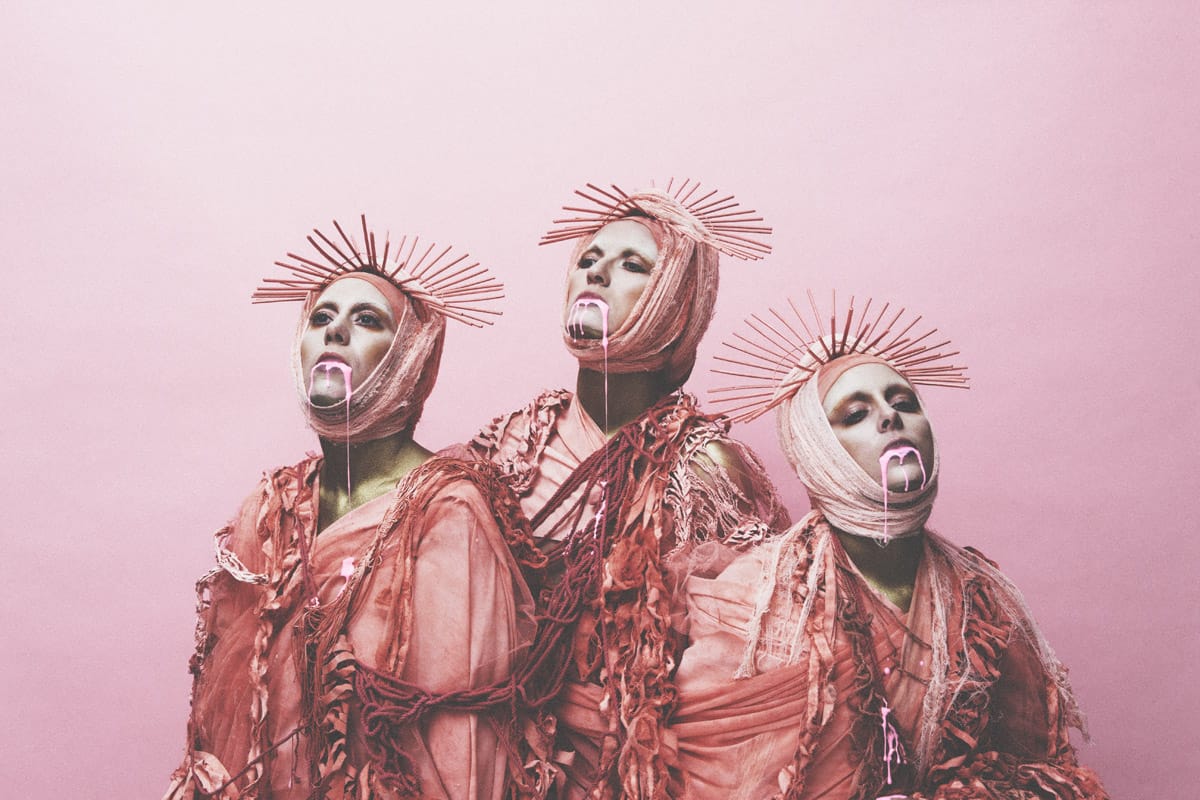
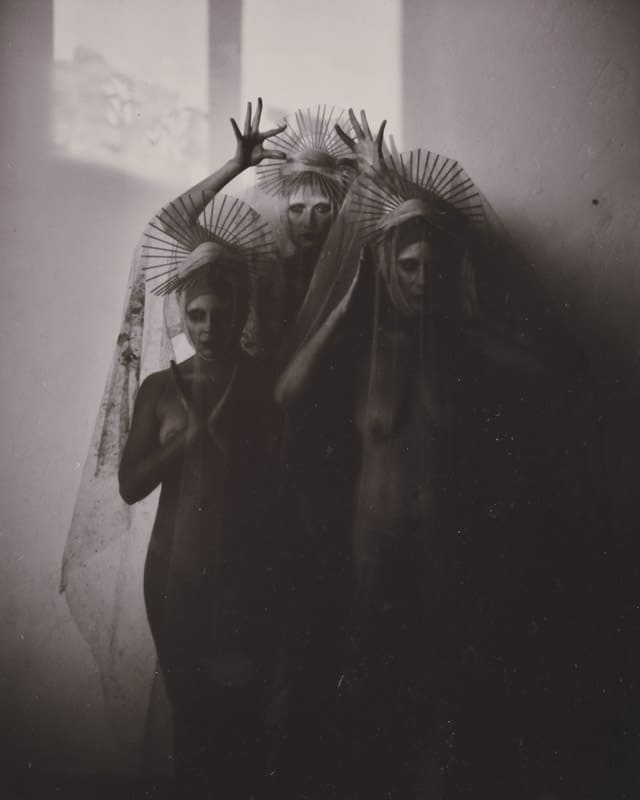

Wife by Eliot Lee Hazel
Because you can see it!
Yeah, you can see it! And strobes, I tend to not light unless I’m shooting fashion, and I know I have a guy that knows what I like. But other than that, it’s either too blown out, or it’s either too dramatic, or it’s too much of a hassle, like, ahh, it’s too dark, it’s too light! And when I have constant light, I just go, “perfect, guys! Don’t touch it anymore.”
Yeah.
And then I just shoot away. But a strobe is always just spitting out the light.
It’s only there for that half second, then you’ve got to look, and then ugh, change it, and then all over again.
And maybe that’s just me, you know, maybe strobes are as easy, but I’ve always had a difficulty with them. But now, and this is something that I have to be careful with in my words, I never really was a fan of Jurgen Teller. I really was always like, “what’s the big deal about this guy?” Until I got it. Once I got it, I was like, “yeah, this guy is kind of a genius.” Because a lot of times the face is blown out, and I would think, “that’s not a good picture.” But it’s the composition, and it’s the moment that he captures it. And now I actually like strobe, and I like a harsh flash..
I find why I like running around a lot, you get unexpected shots, because I’ve fallen into the place of like, okay now I’m going to do this set up, I’ve thought this through, and then, say I’m shooting you, and I go, “shit, I should have been more to the left, I should have been more to the right!” So instead of going, okay look, okay yeah, I like that, click, I now just go clunk, I don’t even have to look through the viewfinder, I just go clunk, clunk, clunk, then I know I’ve got you from every angle, and then when I’m editing, I go, that’s the one. Because if you go like this, you might just overlook that pen, and then you’re like shit, now that pen’s in there.
You like to get coverage.
Yeah, I like to get coverage. But I’m not one of these, clack clack clack clack, I just tend to go clack, okay, got that one, clack, I got that one. I try to keep it under 300 images.
Oh wow.
Even if I shoot a campaign. But, as I said, things are moving so fast these days that some clients, they want 3,000 images. I heard of photographers that shoot 30,000 images. They shoot an entire terabyte, and entire drive.
They just give you the drive, yeah.
And they go, “good luck!” And I find it a nightmare if I have to edit like that, and go through 3,000 images, and going oh god, which ones should I choose, because they’re all almost the same, but if you…
Just a hair.
Yeah, but if you just move around, you’ll always get something different.
Mhmm.
So I guess that’s my strategy.
You’ve been shooting at a very interesting time, because when you started, it was mainly film, and now it’s really kind of transitioned. Your career is basically during the big transition.
It was yeah, right in that transition. I guess there were major digital cameras, but I didn’t know shit. I haven’t been shooting for that long! I’ve been shooting for five years!
Only five?
Ehhh, let me correct that, I have to be really…
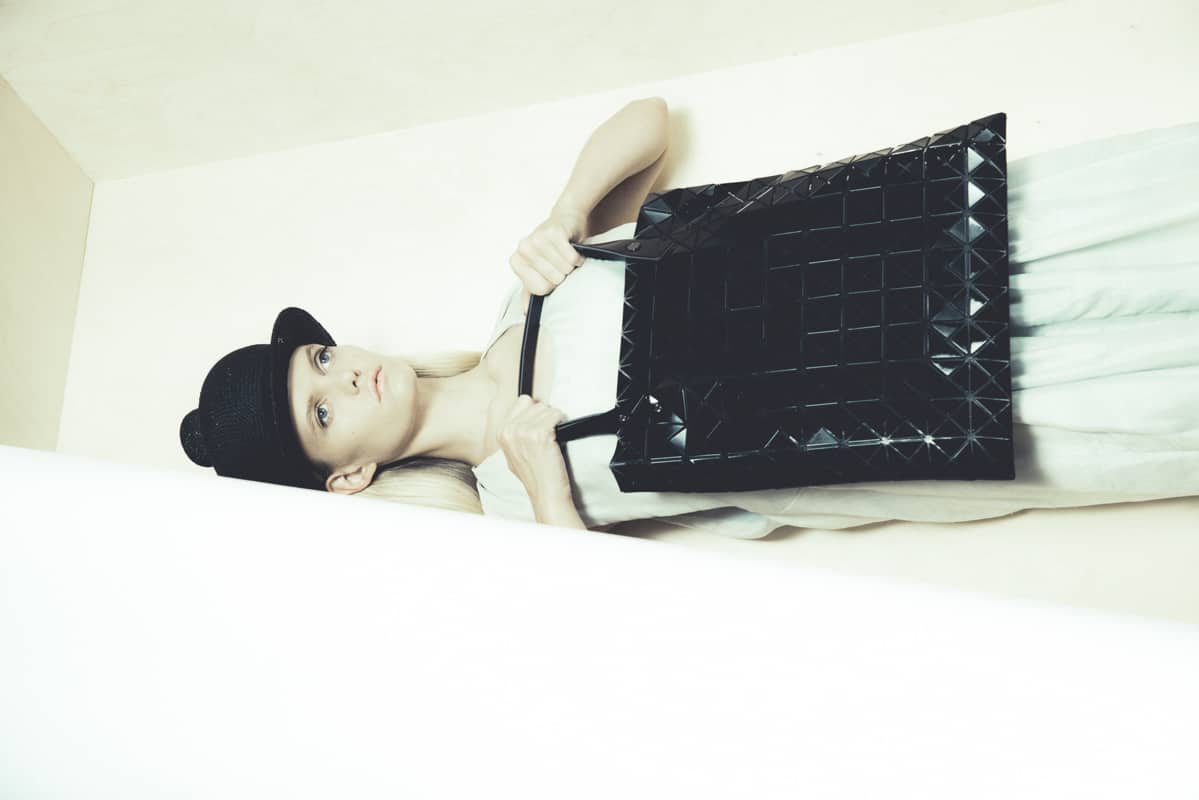
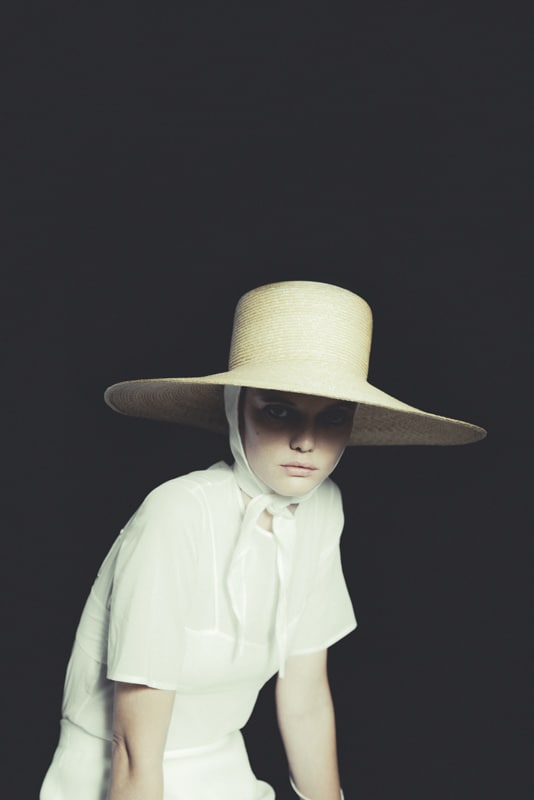
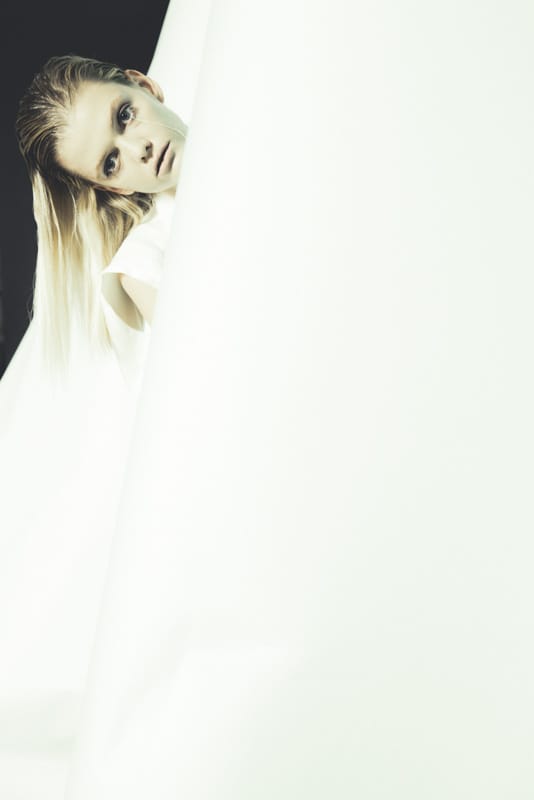
Jennifer Pugh for The Ground Magazine by Eliot Lee Hazel
You’ve been here for eighteen…
Yeah no, but I…let me see when I started shooting…I have to be really, I have a tendency to say, “oh when did you do that shoot, Eliot?” I’ll be like, “oh, that was last month!”
And then it’s three years ago.
Like, “Eliot, that was two years ago.” I’m like, oh shit, it was really three years ago? I’ve been shooting for, I would say six years?
Instagram hadn’t popped up, only photographers took pictures, right?
Only photographers took pictures, yeah.
That was the thing.
But you know, again, don’t mock that in words, I would have to do some research myself, or, you can see, let’s just see, let’s see when I took my first picture. I feel like in the past four, three, four years, it is completely changed. I know a good six or seven people whose careers are about Instagram. They start on Instagram, all their work comes from Instagram. In the past six, seven years, everybody’s taking pictures. All the phones are good enough that you can take pictures that you want to show people, so everybody is showing, Facebook is bigger, Instagram exists. Images are kind of the currency online.
Well, and I don’t know when I started my Instagram account, again, I like to say, “oh, it’s three months ago!” It’s probably a year ago, but I’ve only been active on it, for real active on it, the last three months.
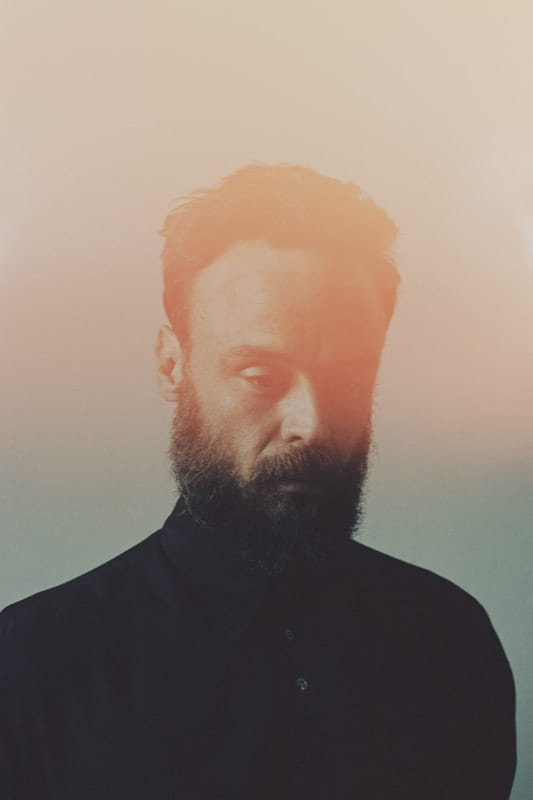
Rodrigo Amarante by Elio Lee Hazel
That brings up an interesting question: do you shoot casually now?
I don’t shoot casually. And I’m going to start doing that, because I want to do my own projects, and I like, I’m starting to kind of fall in love with random snapshots. But no, I used to never do that. I used to like to get a job, talk to the subject, and come up with something. And again, that’s not me planning, but that’s just kind of a rough idea. Yeah, and I had other things going on, you know, in my life, and I don’t like putting a camera in people’s faces. You will never see me at a party, you know, taking random shots. A dear friend of mine, Todd Weaver, he takes random pictures every single day. He takes at least ten pictures a day. Me, you’ll never see me, I never have a camera on me, unless I’m on a job.
Right.
And it’s kind of sad, because you see so much beauty, and often I am walking the street, and I go, “oh, that’s a good shot, look at the shadow of that tree!” But that’s also because I have started to be more interested in that, in that kind of photography. A lot of my photography does look staged, and it is, but it’s not staged with mood boards or me having a concept.
Last question, which do you prefer: the process or the result?
Well that depends. If the result comes out great, then you say, “well, the result,” because I’m happy with what I have. The result is often a pain in the ass. No, the process is often an pain in the ass because the model shows up, you go, “oh man, that’s what you look like? I thought you were a brunette?” “Oh, I just bleached my hair!” Or the location falls through. But that’s a tricky question, because if the result doesn’t turn out great, then the process becomes a headache, too, because you’ve put all that work into it and you’re not really happy with the result. But sometimes, the process is very easy, and then I would say, “ah, this is enjoyable.” I’ve also done shoots where I put so much in the process, so much thought, and then I go, “eh, it didn’t work out the way I wanted it to work out.
So for you, it’s about if it works out? That’s what determines whether it was a good time?
Yeah. You ask this to every single photographer, huh?
I do, a lot of different answers!
For me, it’s the result. It’s like cooking. In cooking, it’s a real process, depending on how long you boil something, how long you sauté something. That depends on what the final result will be. But in that process, I love it, because I’m going, “shit, so I add little cumin, or should I use a bit of tarragon, or should I put a bit of turmeric in that?” And I get excited, because I have all these ingredients, and all these palettes of different flavors and I go, “oh, what am I going to do?” But in the end, it’s still the result, because if I give you the dish, and I go, “what do you think, Lou?” Man, that was worth the process. I thought to myself, “what are you doing Eliot, just for a scrambled egg, you’re two hours in the kitchen? But man, what a scrambled egg.” Or, I can spend two hours in the kitchen, and have a great time with you, but once you take a bite of that scrambled egg, and you go, “ehh, it’s not so good,” then my process kind of gets ruined, because then I think, “goddammit, I wish I had just kept it simple.”
Right, right.
I had such a good time with it, but Lou, he walked out there going, “oh that didn’t really impress me.”
“You call that an egg?”
Hahahha, “you call that an egg?” So I don’t know if that’s a great answer.
No no, it’s good! That’s perfect! And that should do it!
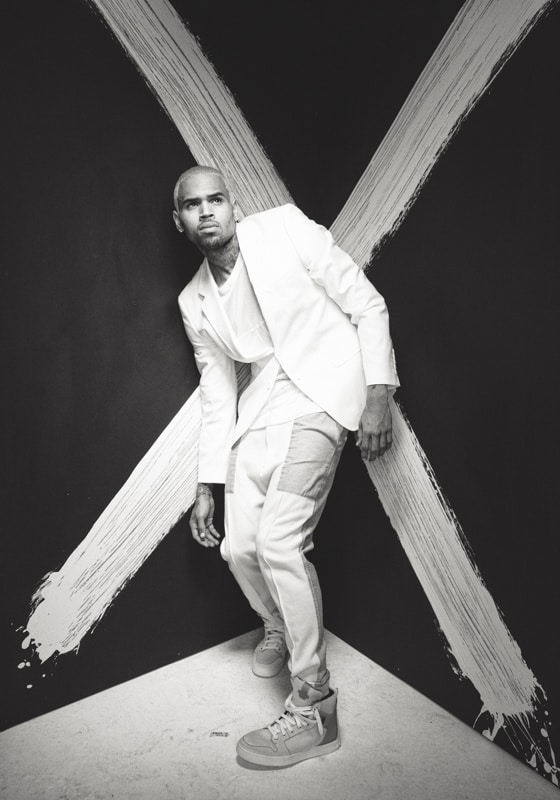

Chris Brown by Eliot Lee Hazel